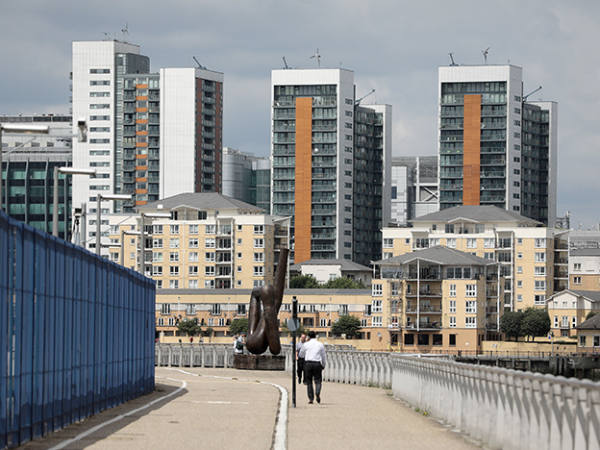- Housebuilders are responding to market slump
- Limited information about bulk deals
The past two years have shown just how cyclical the housebuilding business is. Higher interest rates have slashed private buyers' budgets, so many of the UK's biggest players have been bulk-selling homes to large buyers at discounts and eating the margin hit. Registered social housing providers (RPs), local councils and large institutional private rented sector (PRS) landlords buy these homes, sometimes before construction has completed or even started, and, in most cases, they then lease them out.
The model is an understandable response to a market downturn and can benefit investors, their buyers and the people ultimately living in the homes. However, many of these bulk deals are opaque, despite currently accounting for around a quarter of the largest listed housebuilders' sales on average (see table). There is even less disclosure on RP deals, even though the limited information available suggests they can account for a significant proportion of these deals, and there is evidence of large housebuilder sales to at least one RP that is non-compliant with regulator standards.
We asked the UK's largest listed housebuilders what proportion of their revenue in their most recent results came from sales to RPs, as well as for details on who those RPs are. Vistry (VTY) was the only FTSE 350 housebuilder who agreed to name some of its RP buyers. The rest of the FTSE 350 housebuilders declined to comment beyond the limited information available in their results. Only MJ Gleeson (GLE) and Springfield Properties (SPR), not in the large or mid-cap index, were fully transparent.
Investors should be wary of the opacity surrounding this proportion of housebuilder revenue. A source close to the Regulator for Social Housing (RSH) told us many of the units large housebuilders bulk sold to RPs during the 2008-09 downturn "needed additional work" and that RPs are "not sufficiently commercial when dealing with housebuilders". As such, investors should scrutinise the current crop of bulk sales, especially when the fallout from the Grenfell fire tragedy shows how the high costs of poor dealmaking can come back to bite housebuilders years later.
| Housebuilder | Bulk/partnerships as a proportion of total* (%) | RPs as a proportion of total* (%) | Disclosure of RP names |
| Vistry (VTY) | 100 | 55 | Partial |
| Persimmon (PSN) | 22.7 | 22.7 | None |
| Springfield Properties (SPR) | 22.2 | 16 | Complete |
| MJ Gleeson (GLE) | 22 | 5.72 | Complete |
| Bellway (BWY) | 14 | 13.7 | None |
| Barratt Developments (BDEV) | 12.5 | 4.7 | None |
| Crest Nicholson (CRST) | 26 | Unknown | Partial in results |
| Taylor Wimpey (TW.) | 12.9 | Unknown | None |
| Redrow (RDW) | 2.8 | Unknown | None |
| Berkeley (BKG) | Unknown | Unknown | None |
| *Sales (or completions where sales were undisclosed) as per most recent results | |||
| Source: Company figures, IC analysis | |||
The amount of publicly available information is extremely limited. Some 4.7 per cent of Crest Nicholson's (CRST) home sales were to RPs according to its latest results. Over the same period, the housebuilder entered into four joint ventures (JVs) with RPs through which it is to build homes for them. Two of those JVs, worth a combined £5.8mn, were with A2 Dominion Developments, an RP deemed non-compliant with the RSH's standards. In its latest judgement on the RP from January, the RSH said: "This provider does not meet our governance requirements. There are issues of serious regulatory concern and in agreement with us the provider is working to improve its position."
Asked about our findings, an RSH spokesperson said: “Social landlords must make sure that all their tenants’ homes meet our regulatory standards, as well as relevant building regulations and health and safety requirements. This applies to all homes, regardless of whether they were built by a social landlord, acquired from a third-party developer or delivered through a JV.
“When considering arrangements with private developers, social landlords should carry out appropriate due diligence, identify potential risks and carefully assess how they could impact on their financial plans."
The good news
MJ Gleeson and Springfield Properties disclosed a complete list of the RPs to which they have sold houses. Castles and Coasts Housing Association and Livin Housing bought the small number of social homes MJ Gleeson bulk sold, according to its most recent results, and both are deemed compliant with RSH standards.
Meanwhile, Springfield bulk sold social homes to nine Scottish RPs, all deemed compliant with the Scottish social housing regulator's requirements, and five local councils. According to the Scottish regulator, tenant satisfaction in most of the RPs and councils to which Springfield sold was below the average, but this could refer to sentiment before Springfield sold to them.
Investors may also consider the partial transparency of Vistry as a bull point. It told us it had sold to more than 90 RPs, albeit it only named the for-profit RPs Sanctuary, Clarion, Home Group, L&Q, Sovereign, Livewest, Midland Heart, Abri and Notting Hill, as well as non-profit RPs Sage and Legal & General. All the RPs it named are compliant with RSH standards.
Finally, there are the deals with large PRS landlords. Most of the bulk sales MJ Gleeson detailed in its most recent results were to private equity giant Carlyle Group. And, while Barratt declined to reveal the names of any of the RPs to which it had sold, it has been open about the 258 homes it sold to Citra Living, a PRS landlord owned by Lloyds Banking Group. Meanwhile, Vistry has been open about its 5,000-home deal with Sigma Capital Group.
The transparency matters for investors because while the sector is banking on a housing market recovery, analysts and commentators have suggested that this may not feed through to housebuilders themselves until around 2025. In the meantime, they will likely be engaging in more bulk sales.
And even after a recovery, companies selling en masse will continue. Vistry's whole model depends on it, and others could copy that model even in good times. MJ Gleeson chief executive Graham Prothero said earlier this month that investors should distinguish between bulk sales, where housebuilders begrudgingly "bundle up and sell" homes initially planned for private sales in response to a weak market, and partnerships, where housebuilders such as Vistry intentionally partner with RPs, councils, or PRS landlords ahead of construction.
In other words, while bulk sales might fall away, partnership deals are likely to stay, certainly for Vistry and possibly for other housebuilders. Investors should want to know precisely how much revenue depends on those partnerships, and who those partners are.











